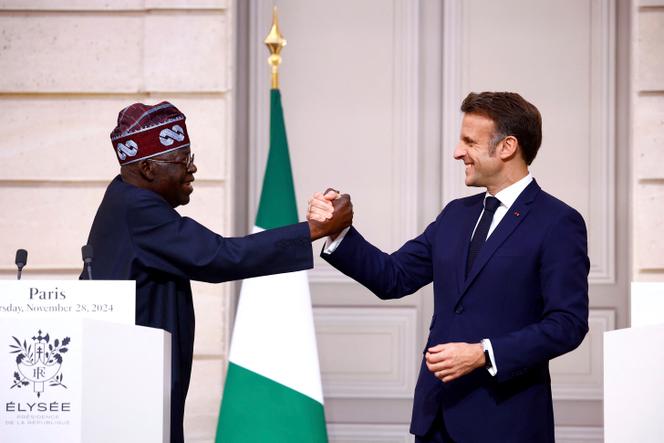


Some relationships require special attention. On Thursday, November 28, and Friday, November 29, in Paris, Nigerian President Bola Tinubu is being hosted on a state visit – the highest level of protocol – by Emmanuel Macron. For the French president, Nigeria is above all a personal matter, which began in 2002, when, as a student at the Ecole Nationale d'Administration, he interned at the French Embassy in Abuja.
Twenty-two years later, ahead of his Nigerian counterpart's arrival in Paris, Macron's entourage readily recalls that his last visit to Nigeria, in July 2018, remains one of his most vivid memories on the African continent. Shirt sleeves rolled up in an electric atmosphere, he spent an evening in the mythical New Afrika Shrine concert hall, created by the father of Afrobeat, Fela Kuti, in Lagos.
The scene was devised by his teams to embody the break with the past that he intended to introduce in his Africa policy when he came to power in 2017. His ambition? To promote the development of economic, cultural and sports partnerships outside Paris's historic preserve in French-speaking Africa.
Seven years on, the promised "software change" seems to have done little to convince Paris' African partners. On the economic front, while trade volumes have risen, France's market share on the continent has plummeted from 5.5% in 2017 to around 3.2% in 2023, according to the French Economy Ministry, with Chinese, Russian and Turkish competitors on the offensive. The "dozens of Airbus" that some diplomats imagined selling to Kenya or Nigeria were never ordered.
France was chased out of the Sahel by juntas who have turned to Russia, and is in a delicate position in other French-speaking African countries. It's still looking for privileged partners in English and Portuguese-speaking Africa, in countries untouched by any French colonial legacy and that provide markets for French companies. One symbol of this change of horizon is that the next Africa-France summit, in 2026, will be held neither in France nor in a French-speaking African country, but in Kenya.
In this rationale of openness, Macron is placing his faith in Nigeria. With over 220 million citizens, Africa's most populous country, rich in gas and oil, is the continent's fourth-largest economy, enough to make it an emerging power, courted by many countries.
Since the first quarter of 2024, Abuja has been Paris's leading trade partner in sub-Saharan Africa. Economic cooperation will therefore be at the heart of Tinubu's visit. On Thursday, after a bilateral meeting at the Elysée Palace, the two leaders are expected to attend the France-Nigeria Business Council, an initiative launched in 2018 by Macron to boost trade relations between the two countries.
You have 50.67% of this article left to read. The rest is for subscribers only.
